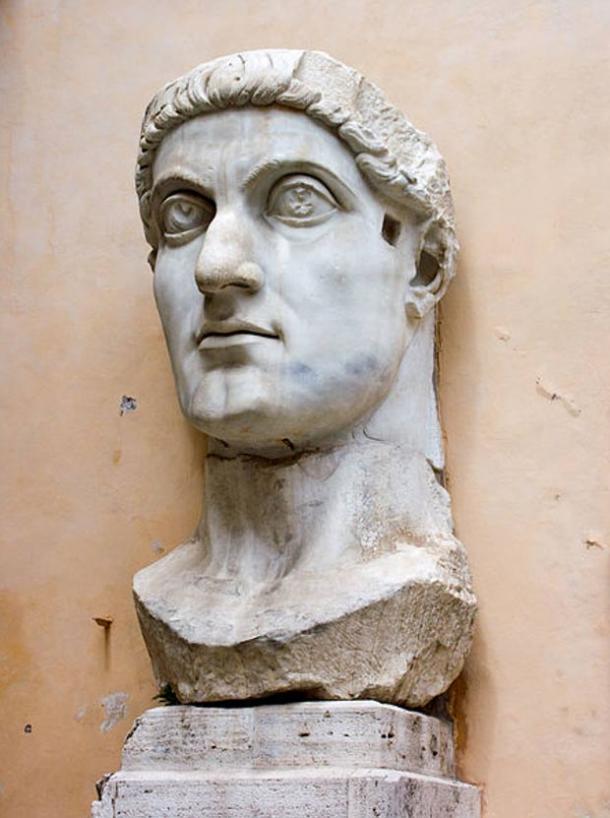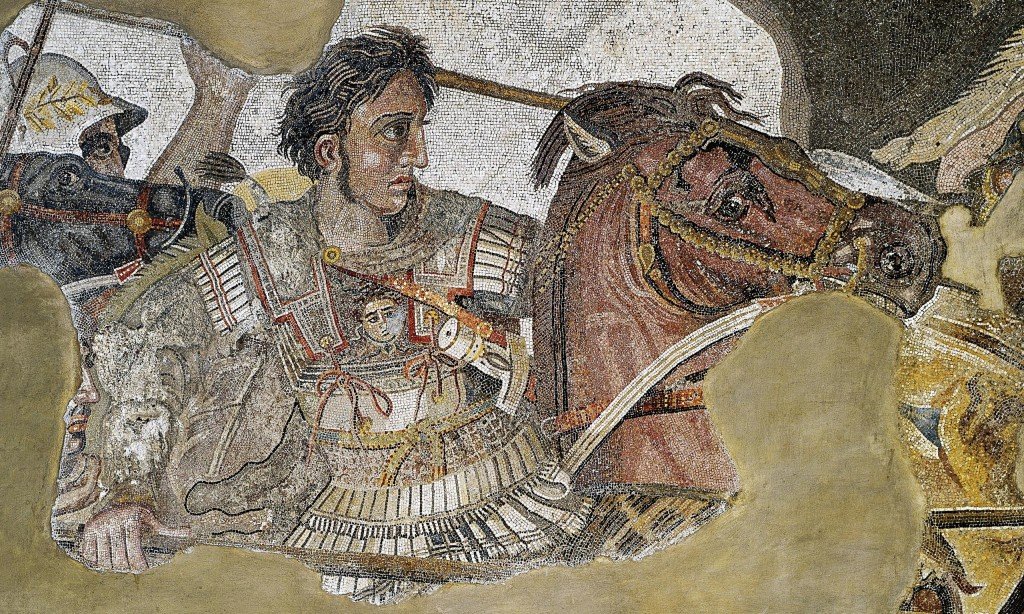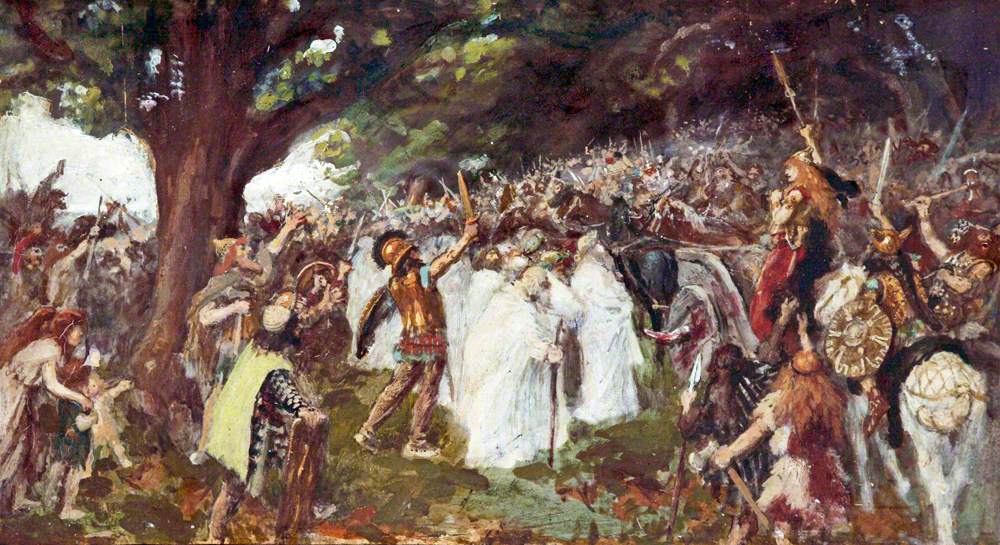















“Here he found the women fighting and perishing in company with the men with such bravery that they uttered no cry even in the midst of slaughter.” (Appian, The Spanish Wars, 15: 71,72)
“A whole band of foreigners will be unable to cope with one [Gaul] in a fight, if he calls in his wife, stronger than he by far and with flashing eyes; least of all when she swells her neck and gnashes her teeth, and poising her huge white arms, begins to rain blows mingled with kicks, like shots discharged by the twisted cords of a catapult.” — Ammianus Marcellinus, Roman Antiquities, Book XV – 12





“Beware the Ides of March.”
You may hear that phrase today because the 15th of March is referred to as the ‘Ides of March’ and marks the anniversary of the assassination of Julius Caesar in 44 BC.
Gaius Julius Caesar was a Roman general, Consul, statesman, and notable author of Latin prose. He was both a conquering hero and a dictator. He played an essential role in the history of Ancient Rome, acting out pivotal parts in events that led to the demise of the Republic and the rise of the Empire.
Caesar started off as an accomplished military man, fighting for the glory of Rome. He was able to extend Roman territory to the English channel and the Rhine in his conquest of Gaul, completed by 51 BC.
He became the first Roman general to invade Britain.
His achievements awarded him the position of an unmatched military prowess, but also threatened to eclipse the role of Pompey, the military and political leader of the late Roman Republic. Pompey, who had previously held an alliance with Caesar and Crassus, had realigned himself with the senate after Crassus’ death in 53 BC.
When the Gallic wars had finished, the Senate ordered Caesar to lay down his weapons and commanded him to return to Rome. Caesar, however, refused. In 49 BC he crossed the Rubicon with a legion. This was the moment that marked his defiance; he had left his province and illegally entered Roman territory, bearing arms. A civil war ensued, but Caesar emerged as the unrivaled leader of Rome.
Caesar assumed control of the government and then proceeded to install a program of social and governmental reforms, such as the creation of the Julian Calendar. He centralised the bureaucracy of the Republic and eventually was proclaimed “dictator in perpetuity”.
Caesar, however, was not popular with everyone – especially the politicos he had ignored.
On March 15th, 44 BC, the Ides of March, Caesar was stabbed to death at a senate meeting.
According to Plutarch, Caesar had been told that this would come to pass. A seer had warned Caesar that harm would come to him, no later than the Ides on March. Then on that fateful day, Caesar passed the prophesier on his walk to the Theatre of Pompey, the place were he would be murdered. He quipped, “The ides of March have come”, thinking that the morbid prophecy had not been fulfilled.
To this the seer replied, “Aye, Caesar; but not gone.”
It is thought that as many as 60 conspirators were involved in the assassination, led by Brutus and Cassius. This scene, as dramatized by William Shakespeare has given us the famous lines, “Beware the Ides of March” and “Et tu, Brute?”
Whether the date was, in fact, the 15th of March is up to debate, as the Roman calendar was structured differently from our modern calendars. For one thing, they only had 10 months. Additionally, the Romans did not number the days of the month sequentially from the first to the last. They actually counted back from three fixed points with in the month and varied depending on the length of the month. These included the Nones (5th or 7th), the Ides (13th or 15th), and the Kalends (1st of the following month).
The Ides occurred on the 15th for March, May, July and October, and were supposed to be determined by the full moon. (This reflects the lunar origins of the Roman calendar).

Written by Ed Whalen, Contributing Writer, Classical Wisdom
We think of Graeco-Roman world as a fairly rational, even secular. However, classical societies were extremely superstitious. In the ancient world, people used religion and magic to help them to cope with what, for them, could be an unpredictable and brutal world.
This led to the rise of not only many religious sects, but also charlatans and impostors.
One of the most notorious of these was Alexander of Abonoteichus. According to one source, he was a false prophet who founded a religion that was enormously influential in the Roman Empire.
Alexander of Abonoteichus
Our main source for Alexander of Abonoteichus is the writer Lucian, a Greek from what is now Syria. However, there are many cultural artifacts, such as coins, that prove that he was a historical figure. Lucian’s account of Alexander is very hostile, and this has colored our perception of him.
Born before 150 ADS in Abonoteichus, a Greek settlement on the Black Sea coast of Asia Minor, Alexander may have been a disciple of the prophet and philosopher Apollonius of Tyana. At some point, he joined a traveling medicine shows that preyed upon the gullible, and during this time he acquired his skills. Alexander was not an ordinary conman—he had ambitions.
The Rise of a Fraud
Sometime around 160 AD, Alexander established a snake cult in his home town of Abonoteichus. The sacred snake was worshipped as Glycon, and according to Lucian, it was a hand puppet manipulated by Alexander. Alexander also persuaded the people of Paphlagonians that Glycon was the reincarnation of the god Apollo. Alexander had Glycon prophesying and offering advice on healing. The cult grew enormously popular and attracted many followers from all over the Eastern Mediterranean.
Lucian writes that Glycon would give ‘nocturnal’ oracles and advise, but only to those who paid. One source claimed that the shrine of the snake god provided 80,000 oracles, paid handsomely for each one. Alexander and his circle must have been fabulously rich. Lucian relates that many people asked Glycon questions and often received answers that were nonsensical or irrelevant. Even so, the faithful came in droves.
Many infertile couples would bring gifts to the shrine in the hope that they would become pregnant. Because of the popularity of his cult, Alexander became very influential in Asia Minor, marrying the daughter of the governor.
The Snake God and Roman Emperors
The 160s AD were exceedingly difficult ones for the Roman Empire. It was ravaged by plague and suffered greatly due to wars with German and other tribes. This meant that many people were willing to believe that Glycon channeled the divine. Versified oracles from Glycon were found inscribed on amulets from the 2nd century AD, attesting to the popularity of the cult.
Alexander was personally summoned by Marcus Aurelius in order to provide oracles, and thus went to Rome. The emperor, faced with a major battle with the Germans on the Danuban frontier, asked Glycon how to win. The snake-god (or glove puppet) told Marcus Aurelius that he would win if he sacrificed two lions by drowning them in the Danube. The battle nonetheless was a disaster for the Romans, one of their greatest defeats in the Macromannic War.
However, this does not seem to have ended the influence of the snake-cult in the Roman Empire. Instead, its popularity grew and is credited with the expansion of the town of Abonoteichus, which was renamed Ionapolis.
The End of Alexander of Abonoteichus
The power and respect that Alexander and his cult held in the late 2nd century AD is evidenced by the discovery of coins that depict Glycon.
The cult of Glycon outlived Alexander, and there is evidence that it was still widely practiced in parts of the Aegean a century after his death. Lucian relates that Alexander declared he would live until he was 150, but died about the age of 70 of a terrible disease.
It appears that the glove puppet was abandoned and Glycon was worshipped in an abstract form. There is some evidence that the religion spread to the region around the Danube. There are also indications that Alexander came to be regarded as the son of Asclepius. It is believed the cult of Glycon finally disappeared in the 4th century AD, after the Christianization of the Roman Empire.
Conclusion
Alexander of Abonoteichus was likely a false prophet and a fraud. The cult of Glycon is testament to the search for meaning in a time of crisis. Alexander was able to use a glove puppet to make himself rich and powerful, eventually establishing a religion that lasted centuries.
References:
Lucian (1925). Alexander the False Prophet. Translated by A Harmon.